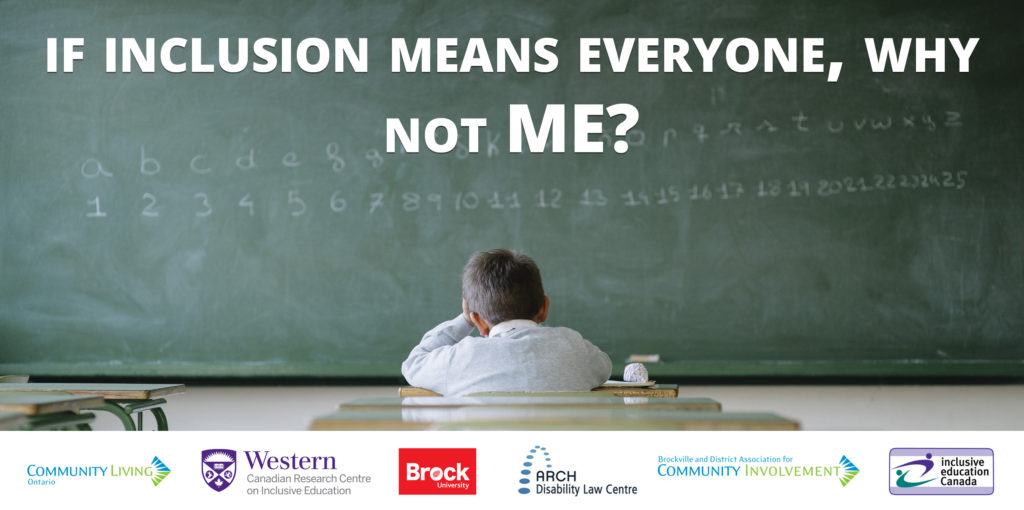
Research partnership finds systemic barriers to inclusive classrooms persist
Toronto, ON – As part of February’s National Inclusive Education Month, a research partnership involving Community Living Ontario, Canadian Research Centre on Inclusive Education, University of Western Ontario, Brock University, ARCH Disability Law Centre, Brockville and District Association for Community Involvement, and Inclusive Education Canada is releasing some of the preliminary results of a research study recently undertaken to, among other things, assess the effectiveness of Ontario’s education system for students with disabilities.
Approximately 300 parents of children with disabilities from across the province were surveyed as part of If inclusion means everyone, why not ME? The survey results found that students with disabilities still experience inordinate barriers to accessing a meaningful academic and social engagement in this province. As a follow up to the survey data, 33 parents agreed to participate in in-depth interviews that allowed researchers to add greater context to the reported statistical data. The results show that Ontario’s commitment to equality, inclusion and full access to students with disabilities remains far from realized.
Exclusion from School
On many occasions children with disabilities experience educational barriers so significant that they are unable to attend school. 45% of parents reported they have had to keep their child home as a result of a lack of accommodations and/or services. Even more troubling, 11% of them reported that their child had been expelled from school for disability-related reasons and 23% of these parents reported that their child had been suspended for disability-related reasons. This is in keeping with statistics released by the Ministry of Education in 2015-2016, which reported that 46.9% of all suspensions and 48.4% of all expulsions involved a student with a disability.
Furthermore, in many cases children are excluded from school outside of the normal suspension/expulsion process; 25% of parents surveyed reported that they had simply been told not to bring their child to school. Parent narratives highlighted the additional hardships that these types of exclusion decisions exerted on families and students. The loss of work, financial strain, conflict, and a concern about the lack of collaborative cooperation in problem solving are only some of the difficulties brought to light.
Academic Barriers
The barriers do not end with exclusion from the classroom. Even when students with disabilities are able to attend school, parents often report that their children do not receive proper accommodation for their disabilities. 53.2% of parents reported that their child was not receiving proper academic accommodations. With this in mind, it is perhaps unsurprising that 68.2% of parents reported that schools were meeting half or less than half of their child’s academic needs. Parents emphasized in their interviews the devastating effects of low expectations and lack of opportunity for engagement.
Bullying
Despite relatively recent initiatives by the Ministry of Education to create a safe and diverse space in the classroom, many students with disabilities continue to be bullied at school. 64.9% of parents surveyed reported that their children experienced some form of bullying related to their disability. Parents reported that this was often done by other students, parents and, at times, even school staff. While parent interviews noted the ever-present reality of their child in these types of situations, they also brought to the forefront the amount of bullying parents and families experience from school systems across multiple levels.
Dispute Resolution
Finally, a majority of parents reported that there had been conflict with the school over their children’s education and that the conflict resolution process available to them fell short in many ways. For instance, 69.1% of parents involved in a conflict reported that they were not given access to necessary information during the process and 63.7% of parents reported that their knowledge of their own child was not properly recognized by decision-makers.
Even more disturbing, a majority of parents involved in a conflict situation reported that at one time or another, no appropriate conflict resolution process was available to them for accommodation issues (52.5%) or inclusion issues (58%). Parental narratives tell the story of poor information, misinformation or no information at all. A critical lack of productive, shared decision-making and collaboration seemed to be characteristic of the experiences of parents.
Conclusion
Overall, from this sample of the data collected, it is clear that the goal of providing excellence in education for all students in Ontario remains elusive. Much more needs to be done to eliminate the attitudinal and policy barriers that prevent full engagement for our students with disabilities and parents, and the research partnership looks forward to publishing a more fulsome report of its findings in April of 2018.
– 30 –
The research study If inclusion means everyone, why not ME? was conducted beginning in February of 2017 in partnership with ARCH Disability Law Centre, Canadian Research Centre on Inclusive Education, Community Living Ontario, University of Western Ontario, Brock University, Brockville and District Association for Community Involvement, and Inclusive Education Canada. Parents of students of who have a disability attending elementary and secondary schools were asked to share their children’s school experiences. There are 72 Boards of Education in Ontario and most continue to segregate students through self-contained classes where they spend the majority of their day.
For additional information, please contact:
Ron Laroche, Director of Communications, Marketing and Fund Development for Community Living Ontario, M: 416-707-4907, rlaroche@communitylivingontario.ca.
